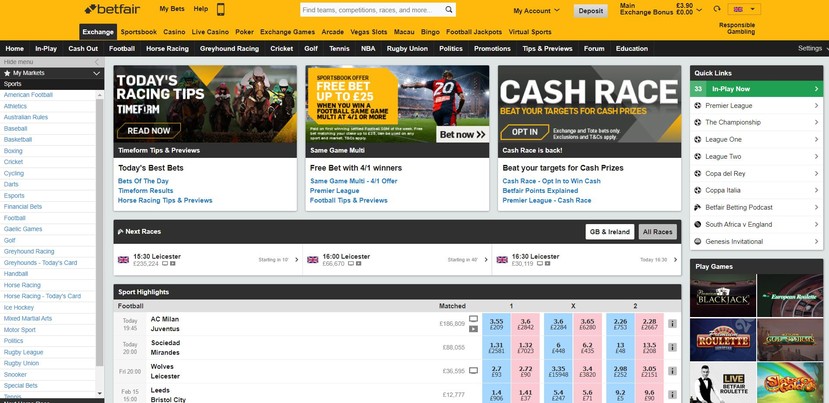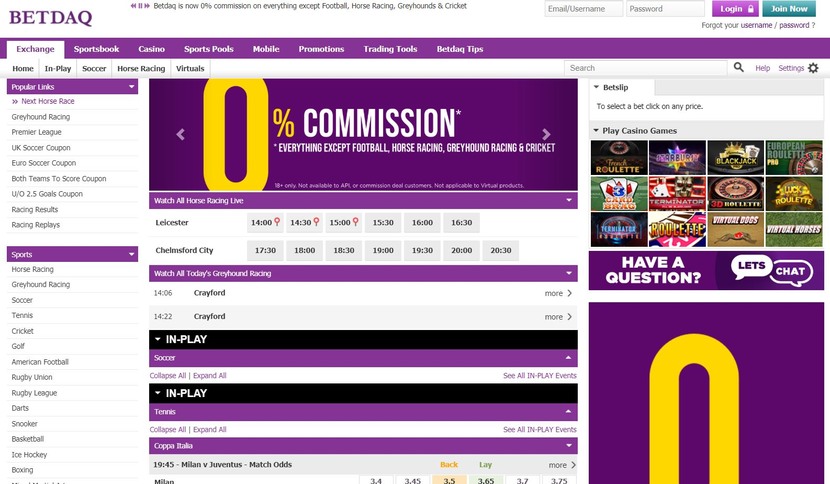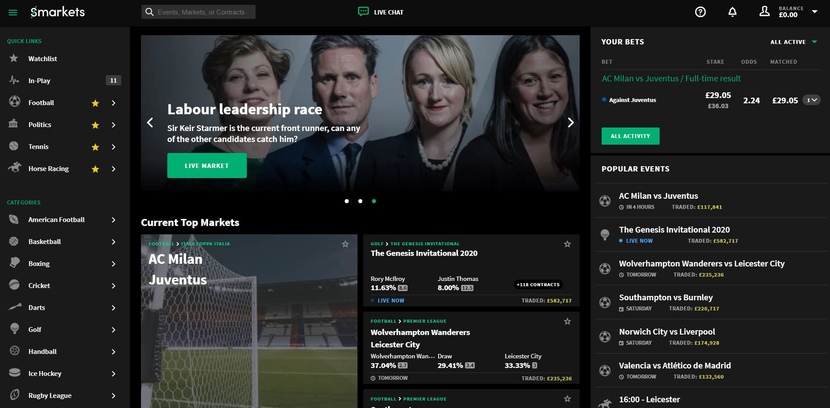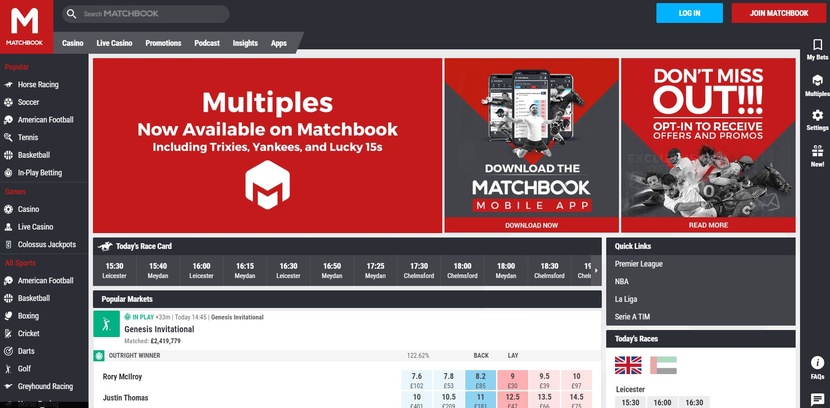 The online betting exchange has existed as a concept since the year 2000, so we have all had plenty of time to get to grips with the idea and give it a try.
The online betting exchange has existed as a concept since the year 2000, so we have all had plenty of time to get to grips with the idea and give it a try.
Yet despite this, a surprising number of seasoned regular bettors are still scared off by this alternative method of having a punt, and that’s odd, because you can often find much better odds at the exchange. We will explain why later on.
There are a few different exchanges out there and we will cover them towards the end of the article, but before we get to that point it’s important that you understand just exactly what a betting exchange is, how it works, and how to use it.
So let’s dive in and see if we can’t give you the confidence to broaden your betting horizons by placing your first wager on a betting exchange.
The Concept
 An online betting exchange allows punters to bet against each other, rather than betting against the bookmaker. The exchange itself isn’t offering the odds or paying out on winning bets, other bettors are.
An online betting exchange allows punters to bet against each other, rather than betting against the bookmaker. The exchange itself isn’t offering the odds or paying out on winning bets, other bettors are.
This is also sometimes called peer-to-peer betting.
In its simplest form, the exchange is just a platform that matches one person who wants to make a bet with another person who wants to take that bet. Those two people will be looking to place bets on opposing outcomes of the same event, and would never have found each other to place that bet without the exchange.
We will explore this thoroughly in the coming sections, but as a basic idea, a betting exchange is simply a place where anyone who wants to make a bet can go to find someone to bet with.
Exchange vs Bookmaker
Even though the bookie and the betting exchange fill very similar roles, there are a couple of key difference in the way that they run.
Backing and Laying
![]() These are two terms you should get your head around quickly:
These are two terms you should get your head around quickly:
- Back – To bet that something will happen.
- Lay – To bet that something won’t happen.
A traditional bookmaker will offer odds on countless markets, but will only allow you to back potential outcomes. That is to say that you can only bet that something will happen. If Wolves were playing Leicester then you could bet that either team will win, but you cannot bet that either team will lose.
A betting exchange allows you to do either. So you can back an outcome or you can lay it. Remember, to lay a bet means that you are betting that something won’t happen, so you can bet that Wolves won’t win, set your odds, and the exchange will match you with somebody that thinks the opposite and is happy to take the odds you have offered. If you lay a bet you are effectively taking the role of the bookmaker.
Margins and Commissions
 The other key difference between a bookmaker and a betting exchange, is that they make their money in different ways, and this where the improved odds come in.
The other key difference between a bookmaker and a betting exchange, is that they make their money in different ways, and this where the improved odds come in.
A bookmaker will fix their odds based on how likely they think it is that the event in question will come to pass. So if they think Leicester are twice as likely the win as Wolves, they can set their odds accordingly.
The thing is, the bookie needs to make a profit, so they aren’t going to give you the true odds, they are going to give you slightly lower odds than reality may suggest. They do this with the odds of Wolves winning too, and that way they make a profit whatever happens. This is called their margin, vig, juice, cut – it has many names.
The betting exchange, on the other hand, doesn’t need to work in a margin because they are not setting the odds, the punters are doing that themselves. All the exchange is doing is providing the platform (or the marketplace) on which the betting is taking place.
But the exchange still needs to make money, so they take a small commission from the winning punter. This can be between 2% and 5% of their profit, and it doesn’t bother the winning punter because they have still won more than they would have by taking fixed odds at a bookie, while the losing punter would have lost anyway, so it makes no difference at all to them.
How to Use a Betting Exchange
When you arrive at your chosen exchange you will see that things are laid out a little differently than you are used to. For a start, there is a back price and a lay price presented for each market, usually denoted by different colours.
These prices can change at any time, and for live or particularly fluid markets – those with lots of people betting on them – the odds can increase and decrease every few seconds.
You obviously want the best price for your bet but you need to get it matched as well, so while you can up the odds a little if you are feeling cheeky, be aware that if you push it too far your bet could end up sitting there waiting to be matched indefinitely.
Look at the image below:

This is the Win/Draw/Win market for Wolves vs Leicester. The odds in blue are to back, and the odds in pink are to lay. You can see the odds displayed in the top half of each box and an amount of money in the bottom half of each box. This money indicates how much is available to be matched at those odds; so in this image if you want to back or lay the draw you will have no problem, whereas if you want to lay Wolves to lose you are more limited, as there is only £56 available.
Market liquidity plays a huge role here, because it goes without saying that you can’t place a bet on an exchange if no one else is interested in betting on the same market as you. This means that less popular sports or events can be harder to use at the exchange, whereas the bookie will always take your money.
You wouldn’t get very far betting on this market, for example:

The process of actually placing a bet is a little different depending on whether you are backing or laying, so it’s a good idea to take each case in point.
Backing
We will cover backing first as it is the closest thing to betting with a traditional bookmaker.
When placing a back bet, everything is nice and simple and the stake you wager is the as it appears. So if you want to bet £10 on the Pittsburgh Pirates to win, you need £10 in your account.

Next, it’s simply a case of clicking on the odds you want, entering your stake as normal in the drop down box, and if you are happy with the potential profit on show you place the bet.
When backing using our example, your bet will pay out if the Pirates win. If they lose or draw your bet is lost. Similarly with horse racing, if the horse you backed wins then so do you, but any other horse winning means a lost bet – just like at a regular bookie.
Laying
Now let’s look at how a lay bet is different to back bet.
Remember, laying a bet is betting that something will not happen, so you are taking the role of the bookmaker here. That means that if you lose you need to pay out, just like a bookie would. So you need enough money in your account to cover this potential loss. This is called your liability.
Your liability can be more than you stand to win from the bet, much more in some cases, and once you lay the bet that money will be gone from your account and not returned unless your bet wins, so you need to be careful here.

To place a lay bet, simply click the lay odds you want to go for (and adjust them if you like) and enter your stake, then the betslip will show you how much your liability is. It’s key to note that when laying a bet your stake is the amount you stand to win, not how much you stand to lose as it would be with a back bet.
You can set your odds however you like, but again, if you want to get them matched and your bet to go live you can’t be too greedy. If your bet is not matched your money is safe, but you won’t have won anything.
Using our example, if you had placed a lay bet on the Red Sox your bet would pay out if they lost or drew the game. Your bet would only lose if the Pittsburgh Pirates win. With horse racing, your bet will win if any other horse wins the race, but if you lay a horse that wins then your bet is lost.
Betting Exchanges: A Brief History
 Way back at the turn of the century, the traditional bookie got something of a kick up the backside when a couple of young upstarts developed their betting exchange idea and turned it into what we now know as Betfair.
Way back at the turn of the century, the traditional bookie got something of a kick up the backside when a couple of young upstarts developed their betting exchange idea and turned it into what we now know as Betfair.
The idea was something of an industry disruptor, and many traditional bookmakers were extremely vocal with their dislike of this new way of doing things. It probably wasn’t helped by the fact that Betfair launched with a marketing stunt that laid rest to the traditional bookmaker, complete with a coffin and funeral procession.
Claims of illegal gambling and match fixing were bandied about, but none of them seemed to stick and the punters were certainly voting with their feet.
In actuality another exchange going by the name of Flutter was also in operation in the early days, even pipping Betfair to the post to be first to market, but the two companies soon decided that a united front would serve them better, so they merged and became a doubly powerful force in the industry, keeping the Betfair name.
The early success of Betfair inspired a good number of followers, but none have ever reached the same level of popularity, and since betting exchanges are all about liquidity, this means they are not as reliable as Betfair either.
Those that still operate try to encourage new customers with lower rates of commission on winnings which seems to keep them ticking over, but what has been most interesting to see is that those big brand traditional bookmakers who were so vocally anti-exchange at the beginning, are now embracing the idea.
Ladbrokes have teamed up with BetDaq, and Paddy Power merged with Betfair under the umbrella company of – confusingly – Flutter Entertainment.
Betting Exchanges in the UK
Betfair

The undisputed Daddy of the betting exchanges, Betfair is the oldest, busiest, and best betting exchange in the country if not the world.
Having been around for so long they have managed to sweep up a large share of the market, and it is incredibly difficult for other newer companies to encourage customers to switch over to them, because they don’t yet have the liquidity. It’s a catch 22.
Betfair have since opened their own sportsbook that runs alongside the exchange, as well as offering a casino and other betting products.
Since they are the best platform offering the most markets and with the greatest liquidity, they are able to command commissions of 5% without really upsetting anyone, so they are also the most expensive betting exchange to use.
BETDAQ

Betdaq came along shortly after Betfair, launching in 2001 under the direction of Irish businessman Dermot Desmond.
This short delay cost them dearly though, and they always played second fiddle to Betfair, which in turn meant that they were never able to plough the same sort of resources into improving and maintaining their product.
However, since they were taken over by Ladbrokes in 2013 they have been trying various tactics to pull in new customers and increase liquidity. For a long time their commission rate was just 2%, but in 2020 they announced a 0% commission rate on most sports, excluding football, horse racing, greyhound racing, and cricket.
By the by, the exchange you will find on Ladbroke’s site is actually just Betdaq in disguise. It is exactly the same platform, with the same markets and liquidity, so using one is no different to using the other.
Betdaq are based in Gibraltar and have a staff of a little under 100 people.
Smarkets

They haven’t been around as long as Betfair or Betdaq, but Smarkets have certainly come out all guns blazing.
They shout from the rooftops about their 2% commission rate and are hot on sponsorship to increase their visibility too.
Launching in 2008 from their London headquarters, by 2016 they had handled over £3 billion worth of trades, up £2 billion from the year before. With that sort of growth they are nipping at the heels of their competitors.
They market themselves as an ‘advanced betting platform’, are incredibly easy to use, and are particularly well known for political betting markets as well as sports.
Matchbook

If all the other betting exchanges were going for a game of football, Matchbook would be the kid who wasn’t invited but kept trying to join in.
Another with a 2% commission rate for UK customers (4% elsewhere), they don’t tend to have the same liquidity on a lot of markets and their platform isn’t as pleasing to use either.
You can actually get some good prices here, but every race needs a loser and at the moment, it seems like it’s Matchbook. Perhaps there just isn’t quite enough room in the market for more than a handful of betting exchanges.
Nothing is set in stone though, and as the market grows they could well attract new customers and therefore increase their appeal to yet more.
The company has been active since 2004, but was bought out in 2011 by a group of financial banking and UK sports investors and has been under new management since.
They are officially based in Alderney.
